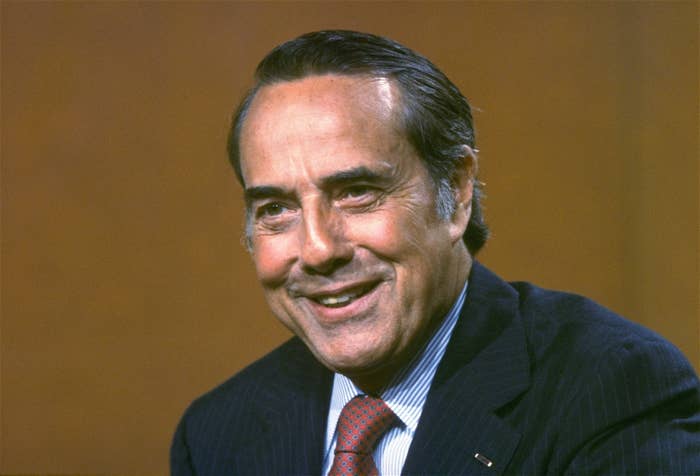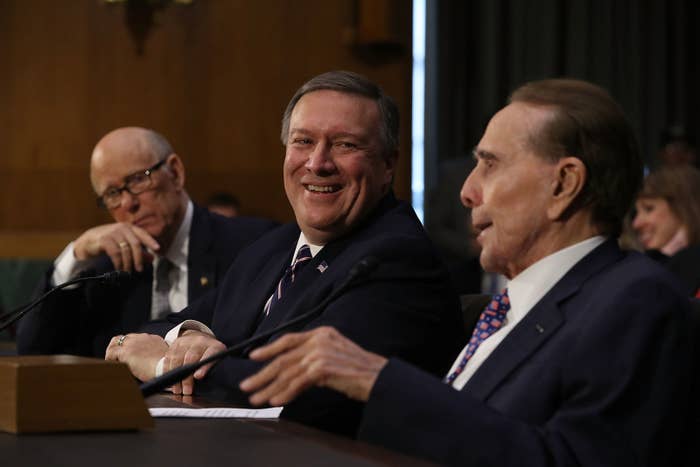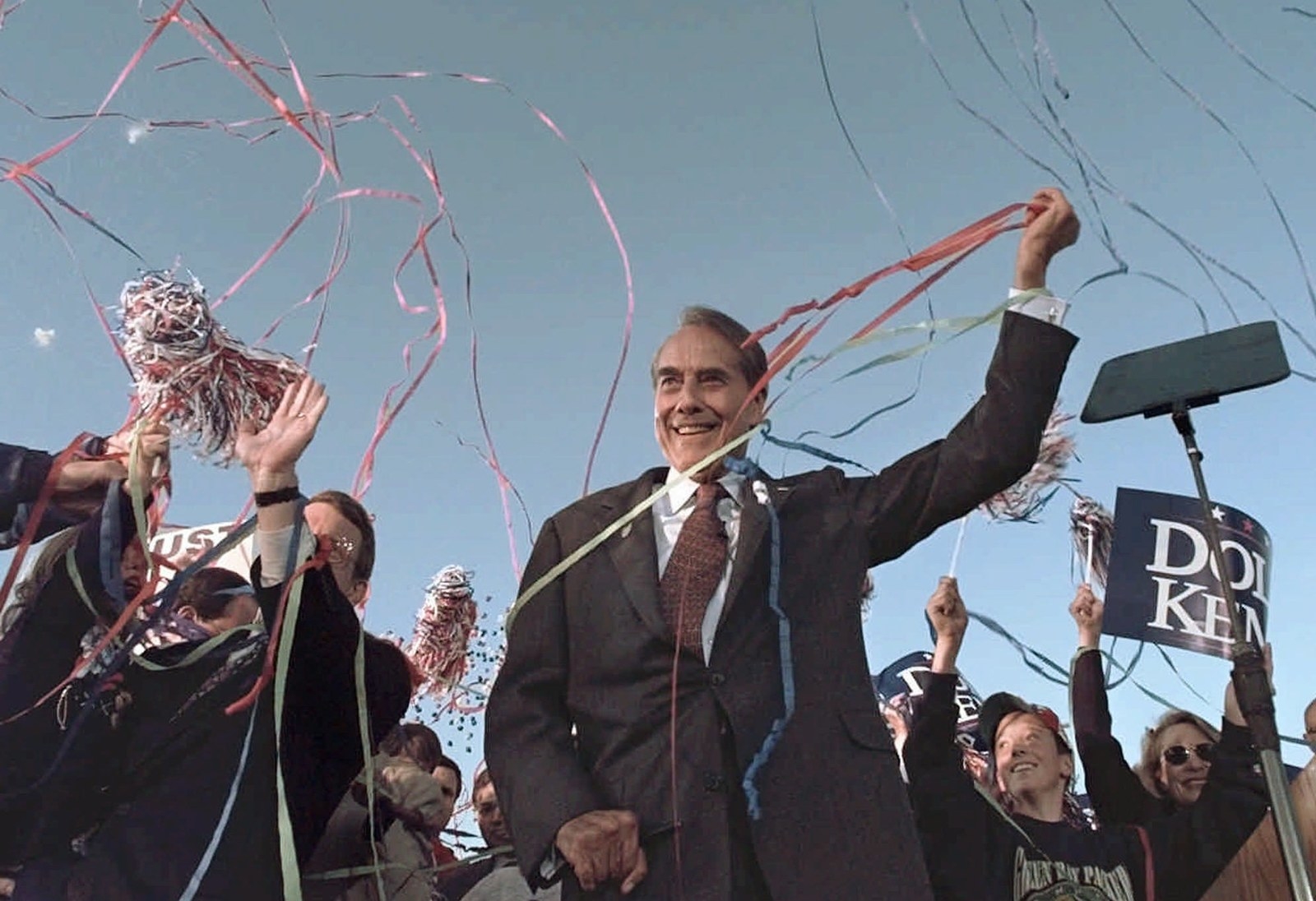
Bob Dole, one of the leading Republicans of the 20th century, has died. He was 98.
He had announced earlier this year that he had stage 4 lung cancer.
"It is with heavy hearts we announce that Senator Robert Joseph Dole died early this morning in his sleep," the Elizabeth Dole Foundation wrote Sunday on Twitter. "At his death, at age 98, he had served the United States of America faithfully for 79 years."
Born to little and thereafter nearly dying during World War II, Dole became one of the most powerful politicians in Washington, DC, serving decades in Congress and running for president three times, ultimately serving as Senate majority leader and winning the Republican Party’s nomination in 1996.
Well into his 90s, Dole kept working, still in the mix, lobbying and commenting and endorsing candidates for office. From beginning to end, Dole, who lost most of the use of one arm from a World War II injury, championed the rights of and better treatment for the disabled, culminating in the Americans With Disabilities Act, the landmark law whose passage Dole presided over as Senate minority leader in 1990.
“It is a group who no one joins by personal choice,” Dole said of the disabled in his first speech from the Senate floor in 1969, “a group whose requirements for membership are not based on age, sex, wealth, education, skin color, religious beliefs, political party, power, or prestige.”
“As a minority, it has always known exclusion,” he went on, “maybe not exclusion from the front of the bus, but perhaps from even climbing aboard it; maybe not exclusion from pursuing advanced education, but perhaps from experiencing any formal education; maybe not exclusion from day-to-day life itself, but perhaps from an adequate opportunity to develop and contribute to his or her fullest capacity.”
In a statement Sunday, President Joe Biden remembered their friendship and many years as Senate colleagues. Though they often disagreed, he said, he praised Dole's humor, integrity, and bipartisan accomplishments.
"When he managed the bill to create a federal holiday in the name of Martin Luther King Jr. — a bill that many in his own caucus opposed — I will never forget what he said to our colleagues: 'No first-class democracy can treat people like second-class citizens,'" Biden said.
Born in 1923, Dole grew up during the Depression and emerged a star athlete in small-town Kansas and played college basketball at Kansas University — only to be struck down and nearly killed by a bullet in the closing days of World War II in Europe. For the rest of his life, Dole had little use of his right arm.
In Richard Ben Cramer's account of the 1988 presidential campaign, What It Takes, he offers an intricate, vivid portrait of Dole's military service and the will required to recover from the injuries he sustained:
The wire said “seriously wounded,” but that wasn’t what the doctors thought. The guy was finished—as far as movement was concerned, anyway. And sooner or later, that meant infection, or pneumonia, or a half-dozen other diseases that preyed on a bedridden man. The best they could do was ship him to the big hospital for the Med, the Seventieth General, in Casablanca. Maybe they could do something for him there. Maybe, if the bones healed, he’d get some feeling back in his limbs. Maybe. It was a surprise already, the way this guy hung on.
A few nights before they shipped him out, Captain Woolsey was in the ward for his rounds, and he called Colonel Prosser over.
Woolsey said to Dole: "Lieutenant, show the Colonel what you can do."
For half a minute nothing happened.
"Go ahead, Lieutenant, show him."
And then, with great effort, with the muscles in his jaw twitching from the effort, Dole raised his left arm four inches off the sheet on his chest.
Dole spent years regaining his physical strength (he had been unable to feed himself when he returned from Europe) and undergoing a series of painful surgeries. He worked his way through law school largely through memory because he was unable to take notes. Elected in 1960, Dole served eight years in the House of Representatives before running for and winning his Senate seat, which he held until he retired in 1996.

Though preeminent in party politics for decades, Dole didn’t quite fit into any of the big movements or dynasties that dominated the Republican Party during his life — he was not a leader of the “Reagan revolution”; nor was he a member of the party’s dying liberal wing in the ‘60s when he was first elected, or a Bush family ally.
Instead, Dole reflected the postwar success of the Greatest Generation and decades of institutional bipartisanship in Congress; his was a Washington-oriented political power. That perhaps explained his incredibly sharp criticism of Sen. Ted Cruz, a proud disrupter of normal order in the Senate, during the 2016 primaries and his ultimate endorsement of President Donald Trump over Cruz in the Republican primaries. Dole was the only former Republican presidential nominee to endorse Trump (neither Mitt Romney nor George W. Bush endorsed him; nor did John McCain or George H.W. Bush, who have since died).
In an interview with USA Today in July, Dole continued to identify himself as a "Trumper," though perhaps "Trumped out." He acknowledged that Trump had lost the 2020 election, shooting down the false claims of fraud spread by the former president and some associates.
In Washington, Dole saw or participated in many of the central political events of the latter half of the 20th century: He voted for the Civil Rights Act of 1964 and the Voting Rights Act the next year; he served as chairman of the Republican National Committee in the early 1970s in the Watergate era; he was Gerald Ford’s running mate in 1976; he was in a key position of power during the legislatively productive 1980s and early 1990s.

Dole ran for the presidency three times, unsuccessfully: In 1980, he put up a short-lived effort. In 1988, he won Iowa before decisively falling behind President George H.W. Bush. In 1996, he won the nomination, only to lose decisively to President Bill Clinton on the rising strength of the US economy, as the Republican Party wrestled with how socially and fiscally conservative the party should be.
“Which is more important, wealth or honor?” asked Dole, the last of his generation to serve as a presidential candidate, in his nominating speech to the Republican National Convention.
The RNC crowd answered him: “Honor.”
“All things do not flow from wealth or poverty — I know this firsthand and so do you,” Dole said. “All things flow from doing what is right.”
